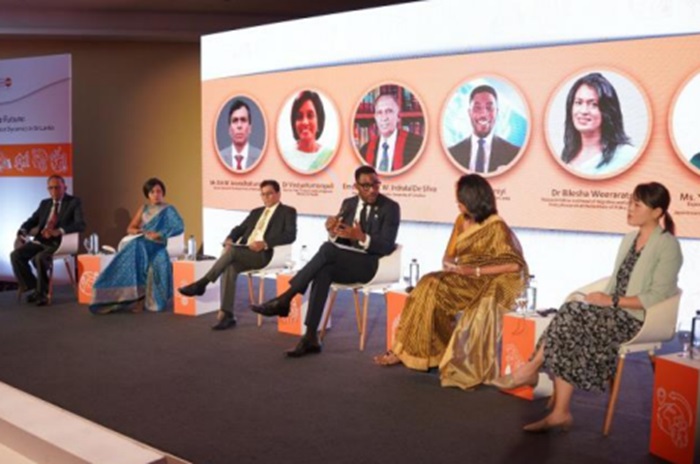
Sri Lanka’s total fertility rate of 5.3 children per woman in 1953, has dropped to just 1.97 in 2023, well below the replacement level, said experts at the policy dialogue on Shaping the Future of Sri Lanka.
According to the United Nations Population Fund (UNFPA), experts pointed out that this decline in fertility is intertwined with another demographic shift, the rapid ageing of the population. By 2041, one in four Sri Lankans is projected to be over 60.
Moreover, internal and international migration adds another layer of complexity to this demographic mosaic. While the annual outflow of Sri Lankan labour migrants, predominantly to the Middle East, brings in vital remittances, averaging USD 7 billion per year, this trend also leads to brain drain and family separation, with significant economic and social repercussions.
Sri Lanka’s demographic shifts, in terms of low fertility rates, an ageing population, and evolving migration trends, pose both challenges and opportunities for sustainable development. These stem from advancements in healthcare, education, and economic opportunities, which have led to better living standards and increased life expectancy, thus reducing fertility rates and population ageing.
In comparison to more developed nations, Sri Lanka, however, undergoes these changes amidst persistent inequality, lower per capita income, and less advanced institutions, affecting overall socioeconomic development, healthcare and social structures. While there are significant challenges, there is also potential to leverage a ‘demographic dividend’ to foster sustainable growth.
The policy dialogue on Shaping the Future of Sri Lanka, provided a vital platform for policymakers, subject experts, academia, civil society and other key stakeholders to come together and engage in a profound discussion on how to formulate comprehensive population policies at the national level to navigate the country’s demographic transition.
‘Shaping the Future: A Policy Dialogue on Population Dynamics in Sri Lanka’ by UNFPA Sri Lanka in partnership with the Ministry of Finance, Economic Stabilization and National Policies was held in March in Colombo. The policy dialogue brought together key stakeholders including policymakers and subject experts to discuss Sri Lanka’s changing population dynamics in terms of ageing, low fertility, and migration.
Ahead of the United Nations global ‘Summit of the Future’ set for September 2024, it is imperative that Sri Lanka prepares to address its pressing population issues, as all United Nations member states come together to recalibrate our journey towards achieving the 2030 Agenda for Sustainable Development Goals.
The Policy Dialogue was attended by distinguished guests including, Mr. Priyantha Rathnayake, Deputy Secretary to the Ministry of Finance, Economic Stabilization and National Policies, Anuradha Kumarasiri, Director General of the Department of National Planning, Mrs. Anoja Seneviratne, Director General, Department of Census and Statistics, Mr. Ajith Abeysekera, Director General, External Resources Department, DIG Renuka Jayasundara, Deputy Inspector General, Sri Lanka Police, and Kunle Adeniyi.
Kunle Adeniyi, Representative of UNFPA Sri Lanka moderated the policy dialogue featuring Mr. R.H.W. Anuradha Kumarasiri, Director General of the Department of National Planning, Dr Vindya Kumarapeli, Director, Policy Analysis and Development, Ministry of Health, Emeritus Prof. W. Indralal De Silva, Department of Demography, University of Colombo, Dr Bilesha Weeraratne, Research Fellow and Head of Migration and Urbanisation Policy Research, Institute of Policy Studies, and Ms. Yasuko Nakajima, Expert in Women’s Empowerment / Policy Coordination, Japan International Cooperation Agency (JICA).
As part of the dialogue, UNFPA’s 2024 State of the World Population (SWP) Report was launched. The SWP report highlights sweeping global gains in sexual and reproductive health and rights over the last thirty years are marred by an ugly truth – millions of women and girls have not benefited because of who they are or where they were born.
UNFPA Sri Lanka together with Sri Lanka’s Ministry of Finance, Economic Stabilization and National Policies also unveiled an Issue Brief titled, “Population Dynamics and Sustainable Development: Low Fertility, Population Ageing, and Migration in Sri Lanka and its Implications for Development.”
A comprehensive population policy is the cornerstone of navigating Sri Lanka’s demographic transition. These policies should integrate all aspects of demographic change, including ageing, fertility, migration, and gender equality, into a cohesive framework. It should be evidence-based, adaptable to changing circumstances, and aligned with the Sustainable Development Goals. Moreover, the upcoming Summit of the Future could be utilized as a pivotal platform in garnering international support and global collaboration in addressing these key challenges through rights-based and gender-responsive approaches.
By aligning national policies with global standards and leveraging international cooperation, Sri Lanka can navigate its demographic transition towards a sustainable and inclusive future. This strategic approach not only strengthens the country’s own development trajectory but also positions Sri Lanka as a vital contributor to the global dialogue on sustainable population dynamics, helping to shape the future for a more inclusive and equitable world for all. (Newswire)
